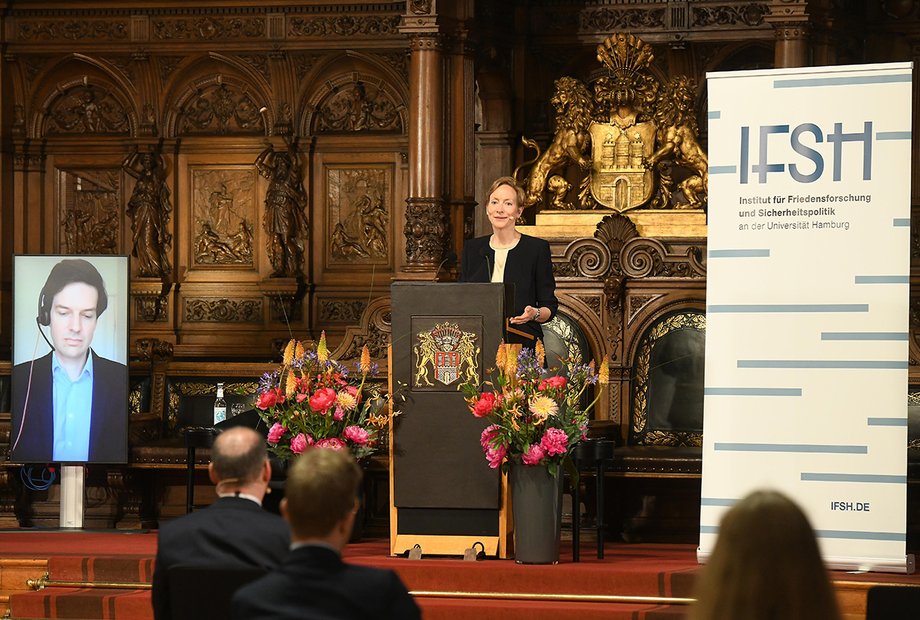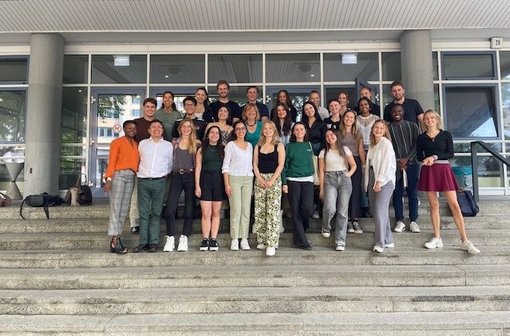“Peace is not everything, but without peace, everything is nothing.” This dictum from Willy Brandt is our mandate and our motivation. For 50 years, we have been researching the mutually dependent relationship between security and peace. We have accomplished a great deal in the meantime; the IFSH is now one of the leading peace research institutes in Germany. It’s time we took a look back, but most of all, it’s time to celebrate! On the occasion of the Institute’s 50th anniversary, Katharina Fegebank, Second Mayor of Hamburg and the city’s Senator of Science, held a celebratory Senate reception at the Hamburg City Hall on 11 June. The ceremony was broadcast digitally via livestream and was translated by a sign language interpreter.
The grand ballroom of the Hamburg City Hall is normally used for large receptions and galas attended by international guests of state. The fact that Second Mayor Fegeback invited our Institute into this space, the largest and most magnificent of any City Hall ballroom, in recognition of the work we do was a great honour for the IFSH.
“The city of Hamburg is proud and grateful to have such an excellent think tank concerned with issues of security and peace” – Katharina Fegebank, Second Mayor of the Free and Hanseatic City of Hamburg
“Peace and security affects all of us. It is therefore important that we here in Hamburg, a centre of science and scholarship, have such an excellent think tank to address fundamental questions of European and global security”, the Second Mayor and Senator for Science said in her opening remarks. The IFSH has been engaged in peace research at the highest international level for 50 years now, Fegebank noted, and the Institute’s international reach and reputation has enriched the city of Hamburg as a centre of science and scholarship. With its significant expertise and multifaceted opportunities for exchange and education, the IFSH makes an important contribution to communication and rapprochement within our increasingly divided society, Fegebank continued.
Professor Dr Dr h.c. Dieter Lenzen, President of the University of Hamburg, also praised the IFSH as an important partner for the university in terms of research as well as teaching within the interdisciplinary framework of the Master’s programme Peace and Security Studies.
“The IFSH is an established figure in German and international peace research today. In the last four years alone, we have been able to double the scientific and scholarly capacity of our Institute” -- IFSH Director Professor Dr Ursula Schröder
50 Years of Peace Research in Hamburg: a lot has happened since the Institute was founded in June of 1971. IFSH Director Prof. Dr Ursula Schröder took a look back at some of the highlights of the Institute’s history and underlined the Institute’s successes.
Having gotten its start as a small institute in Falkenstein in the Hamburg neighbourhood of Blankenese, the IFSH’s scientific and scholarly capacity has doubled in the last four years alone. “The IFSH’s focus on the analysis of security challenges and security policy has long been unique within the field of peace research. For us, it is part of the DNA of our Institute”, said Professor Schröder, and made reference to General Graf von Baudissin, founding director of the Institute as well as the IFSH Bundeswehr post, which still exists today. Von Baudissin’s interdisciplinary approach and his ability to build bridges across existing borders of knowledge distinguishes the Institute just as much as, for example, the study of cooperative peace and security strategies within the framework of the OSCE, Professor Schröder said.
“The IFSH is makes an important contribution to our constitutional mandate to act in service of peace in the world” – Minister of State Niels Annen
Niels Annen, Minister of State at the Federal Foreign Office and guest of honour at the Senate reception, praised the IFSH for its valuable contribution to Germany’s constitutional mandate to “act in service of peace in the world”. The IFSH has an important role in its advisory capacity to the federal government, Annen continued. This applies in particular to arms control and the security policy-related risks posed by emerging technologies, as well as to OSCE topics, the publication of the Peace Report, and reform of the security sector. Over the past 50 years, the IFSH and its staff have become a trusted partner with whom politicians and decision-makers can discuss issues confidentially, Annen, a member of the SPD party, said.
“War and peace is a cross-cutting issue that affects all societal actors” – Ole von Uexküll, Right Livelihood Foundation
“For 50 years, the IFSH has made an invaluable contribution to the development of peace policy and has, again and again, provided both civil society and the political realm with guidance and ideas”, Ole von Uexküll added. The executive director of the Right Livelihood Foundation joined the reception live from Stockholm and addressed the guests from a large video screen.
Responsibility arises from a detailed awareness of security policy-related dangers such as the devastating consequences of the use of nuclear weapons, von Uexküll reminded the audience. The normative classification of issues related to peace policy always serves as a barometer for the general public in terms of how serious or threatening these issues are for their daily lives.
A recording of the event including the individual speeches, opening remarks, and the subsequent panel discussion with Minister of State Annen, Ole von Uexküll and Professor Dr Schröder on the role of peace and security research in tackling current political challenges can be found here.
We’ve captured a few impressions from the event in our photo gallery.





